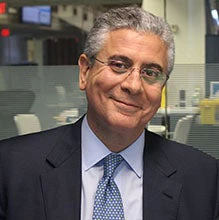 Au moment où le coronavirus se propage dans la région Moyen-Orient et Afrique du Nord (MENA), les rues se laissent aller à l’incertitude et à la peur.
Au moment où le coronavirus se propage dans la région Moyen-Orient et Afrique du Nord (MENA), les rues se laissent aller à l’incertitude et à la peur.
As the coronavirus sweeps across the Middle East and North Africa (MENA) region, uncertainty and fear are gripping the streets. Citizens are turning to their governments to act; however, a lack of transparency over decades has bred distrust and, in many instances, undermined State credibility. People cannot be certain if daily reporting and updates are true. As someone aptly described the region’s leadership response to the COVID-19 pandemic: "When you lose people's trust, even when you tell the truth, people won't believe you."
As if a global pandemic amidst social unrest were not enough, more than any other region MENA is confronting two distinct but related shocks: alongside the spread of the virus, oil prices have collapsed. This is putting pressure directly on the incomes and fiscal accounts of oil exporters; and it is indirectly, but heavily, affecting the region’s developing economies that rely on oil wealth for worker remittances, foreign direct investment and transfers from their high-income neighbors.
As we fight the spread of COVID-19, policies designed to contain the pandemic, such as social distancing, are having short-term recessionary consequences with potentially long-term economic costs. The World Bank Group is committed to helping countries weather these shocks with financing and expertise, with the intention of leaving no one behind.
We have put together a COVID-19 emergency financing facility of US$14 billion, and we are working tirelessly to ramp up our operations. On March 25, the World Bank’s President David Malpass committed US$160 billion over the next 15 months to finance support operations tailored to the needs of each country, with an emphasis on policy-based financing and protecting the poorest households and the environment.
After the virus
Yet at some point, together with our partners in MENA, we will come out of emergency mode. We will need to come out stronger than ever, with a hopeful vision for a brighter future for the region!
To bring a new hope to citizens, we must learn and change. After all, when the virus arrived, the region, and I mean all of it — its leaders, entrepreneurs, educated youth, broader civil society — was already engaged in difficult debates about the past, as well as the future development of their countries. All of society seemed to be at stake, from the nature of political systems to technical aspects of social and macroeconomic policies.
Our new regional economic update contributes important details to these debates by examining the importance of government transparency. If there is a single lesson to draw from the pandemic, it is that transparency in public information can save lives and improve economic outcomes, by enhancing societal trust in the state.
Unfortunately, the region has under-performed, and for decades, in the transparency department. MENA stands out as the only region that has dropped in data capacity and transparency since 2005, as many countries have either lagged in their ability to generate data or have prevented access to data altogether.
More data, please
As the spread of COVID-19 has shown, reliable data and transparency help improve public policies and enhance people’s trust in government. Conversely, lack of data and transparency could be at least partly responsible for the region’s chronic low-growth syndrome.
Since the beginning of the 21st century, growth of output per capita across MENA has been lower than what is typical for economies with the same levels of development. Our new report argues that if MENA had grown at the typical rate observed in the rest of the world over the past 20 years, the region would be at least 20% richer than it is today.
Our economists have also found that the lack of transparency hurts even more when systems are under stress by potent threats such as the current pandemic. Declining data transparency has resulted in losses of income per person ranging between 7% and 14%. So, it is plausible that the lion’s share of income losses, during the 21st century, have been due to lack of transparency.
It is difficult to think of more important, long-term challenges for MENA than raising the pace of economic growth, solving fiscal vulnerabilities and improving the performance of labor markets. Yet, these are areas with missing information or ambiguous data. This latest research helps shed light into the dark corners of crucial ongoing policy debates.
The grievances that have sparked social unrest and protests across MENA can only be addressed by rebuilding trust. The COVID-19 pandemic has put what is at stake in stark relief: nothing less than human lives and prosperity.
Now, more than ever, a new social contract is needed. The process of healing starts with transparency and accountability. More sunlight can help bring a prosperous future to MENA, a future with enhanced societal trust in government, leading to growth and prosperity in the years and decades to come.


Join the Conversation